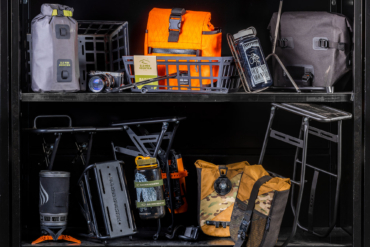The Gear Junkie: Reclaimed Material Messenger Bags
By STEPHEN REGENOLD
Recycling is Rad. That’s the name — as well as the mantra — of a one-woman business in Minneapolis that makes bike messenger bags out of plastic grocery store sacks. Through experimentation over the past year, owner Bekah Worley developed a process that employs an iron and parchment paper to weld plastic sacks into a durable material that serves as the base for three messenger bag styles sold online via www.soulsister.etsy.com and at independent retailers around the country.

The bags employ a ubiquitous messenger style, with nylon shoulder straps, plastic buckles and large internal compartments that close under a flap. But what has made Worley’s creations popular — in addition to their homemade, though artsy, aesthetic — is the bags’ built-in nod to sustainability and resourcefulness: Each Recycling is Rad messenger is made from up to 100 would-be throwaway plastic sacks.
The Minneapolis company is hardly alone in its niche. There is now a cottage industry — somewhat inexplicably — of tiny companies that design messenger bags out of reclaimed materials, including sources as diverse as vinyl sheeting from billboards; feed bags; bicycle and automobile innertubes; old clothes; highway signs; industrial tarps; and discarded rice paper.

Bike tire valves and old seat belts serve respectively as zipper pulls and shoulder straps for Alchemy Goods (www.alchemygoods.com, pictured above), a small bag company in Seattle. Relan LLP (www.relanbag.com, pictured below) of Eagan, Minn., employs a vinyl-laminated nylon material derived from 48 × 14-foot billboards.

As the granddaddy of the movement, FREITAG, a Swiss company, has offered messenger bags made of materials like trucking tarps and used air bags since 1993. The company (www.freitag.ch) grew from two people to now more than 60 employees in its factory in downtown Zurich.
But most companies doing reclaimed messengers are small shops. My research yielded about 10 organizations from around the planet involved in this niche, ranging from a two-brother operation in Vancouver to messengers made by disabled women in Cambodia out of recycled animal feed bags (see: www.gxonlinestore.org).

Most all bags in this genre are custom designed and hand stitched, meaning costs can run higher than a messenger from a major manufacturer like Timbuk2 or Chrome. The Messenger model, the original Alchemy Goods product, costs $168. Recycling is Rad’s pricing goes from $70 for a small messenger to $85 for the large bag, which is average for the product category.
Performance ranges with reclaimed messengers. Some bags will hold up to their calling for bike commuters or people employed as actual bike messengers. Other models are more ornamental — fine for use as a tote, though not made to hold up to the rigors of day-in and day-out abuse on a bike.
Recycling is Rad’s bags, which I tested over a month of cycling and casual use, ride a middle ground between performance and ornamentation. The bag I used — the Large Plastic Messenger model — is bare bones, with a cloth pouch inside the large compartment, two buckles to keep it closed, and an un-padded shoulder strap.

One unique feature: Recycling is Rad includes clips on the bottom of the bag to secure the pack to your pants or belt loops while riding, keeping the package from sliding around on your back.
More than anything, the Large Plastic Messenger — or really any bag of its ilk — is a statement. It’s a fashion piece born of scrap. Wear a reclaimed messenger and you’re an instant conversation piece — a walking, cycling advertisement for sustainability and resourcefulness in a world often bogged down by waste.
(Stephen Regenold writes The Gear Junkie column for eleven U.S. newspapers; see www.THEGEARJUNKIE.com for video gear reviews, a daily blog, and an archive of Regenold’s work.)






